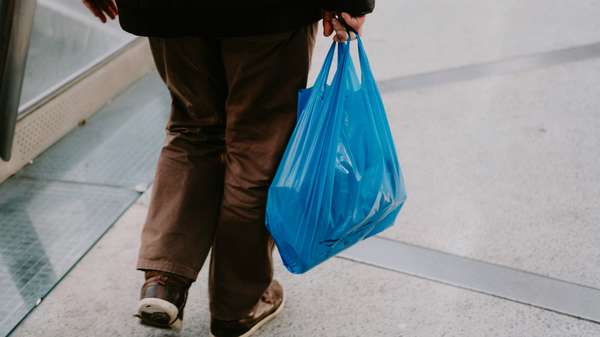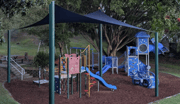
Senator Pauline Hanson has ignited a fierce debate about Australia's plastic bag ban after posting a popular video showing her 25-cent paper bag from Woolworths splitting open in the car park.
The One Nation leader's frustration resonated with thousands of Australians who've experienced similar mishaps since single-use plastic bags were banned nationwide in June 2022.
'Enough is enough,' Hanson declared in her video, which attracted over 14,000 comments within days. Her call to 'bring back plastic bags' has reignited discussions about whether Australia's environmental policies have gone too far in inconveniencing everyday shoppers, particularly seniors and those with mobility issues.
The senator's experience isn't unique. Across the country, shoppers report similar frustrations with paper bags that tear when wet, split under minimal weight, or simply fall apart during the journey from checkout to car.
At 25 cents each, these supposedly eco-friendly alternatives are becoming an expensive source of irritation for many Australians.
The Great Bag Debate: Public Opinion Divided
Hanson's video struck a nerve, generating passionate responses from both sides of the environmental divide. Supporters flooded social media with their own bag horror stories, while environmental advocates defended the plastic ban as necessary for protecting Australia's unique ecosystems.
'I'm sick to death of these paper bags breaking. Last week I lost a whole shop worth of groceries in the car park. Bring back plastic!'
However, not everyone agreed with the senator's stance. Many commenters pointed out that reusable bags offer a simple solution, with some questioning why shoppers continue buying disposable options at all. 'I've been using the same canvas bags for five years,' one user noted. 'Problem solved.'
Understanding Australia's Plastic Bag Ban
Australia's journey to eliminate single-use plastic bags began with South Australia in 2009, followed by other states and territories over the next decade. The nationwide ban, implemented in June 2022, marked the culmination of years of environmental campaigning and legislative action.
Key Facts About Australia's Bag Ban
- Single-use plastic bags banned nationwide since June 2022
- Australians previously used 3.92 billion plastic bags annually
- Paper bags cost 25 cents at major supermarkets
- Reusable plastic bags available from 15 cents
- Some states have additional restrictions on barrier bags
The ban covers lightweight plastic bags under 35 microns thick, typically given away free at checkouts. However, thicker reusable plastic bags remain available for purchase, along with paper alternatives and various fabric options.
The Paper Bag Problem: More Than Just Inconvenience
While paper bags are marketed as an eco-friendly alternative, they come with their own set of challenges. Consumer testing reveals that standard supermarket paper bags can only reliably hold between 3-6 kilograms when dry, significantly less when exposed to moisture.
Common Paper Bag Failures
Bottom seams splitting under weight
Handles tearing away from the bag body
Bags disintegrating when wet
Sides ripping from sharp packaging edges
For seniors and people with disabilities, these failures can be more than inconvenient—they can be dangerous. Groceries spilling in car parks create trip hazards, while the need to double-bag items increases costs for those on fixed incomes.
The Hidden Costs: Financial Impact on Shoppers
At 25 cents per bag, the costs quickly add up. A typical weekly shop requiring 6-8 bags costs an additional $1.50 to $2.00. For families doing multiple shops per week, this seemingly small charge can amount to over $100 annually.
Example Scenario
- Mary, a pensioner from Brisbane, estimates she spends $3-4 weekly on bags because paper bags often break, requiring doubles
- The Thompson family of five calculates their annual bag costs at $156, up from zero before the ban
Many shoppers report needing to 'double bag' heavier items in paper bags, effectively doubling the cost. Some have resorted to keeping cardboard boxes in their cars or purchasing heavy-duty reusable bags that can cost $2-3 each.
Source: Sky News Australia / Youtube.
Environmental Impact: Are Paper Bags Really Better?
The environmental equation isn't as simple as 'paper good, plastic bad.' Manufacturing paper bags requires significant water and energy resources, and they generate more greenhouse gas emissions during production than plastic bags.
Did you know?
Did you know?
A paper bag must be reused at least 3 times to have a lower environmental impact than a single-use plastic bag, according to environmental studies. However, their tendency to break often prevents this level of reuse.
Environmental scientists point out that the best option remains reusable bags made from durable materials like canvas, jute, or recycled plastics. These need to be used 100+ times to offset their production impact, but quality bags can last for years.
Supermarket Responses and Alternatives
Major supermarkets have acknowledged customer concerns about bag quality. Woolworths stated they continuously review their bag options and encourage customers to bring reusable bags. They offer various alternatives including:
- Paper bags at 25 cents
- Reusable plastic bags from 15 cents
- Chiller bags for cold items
- Foldable bags that fit in handbags
- Heavy-duty canvas bags
Coles has similarly expanded its range, introducing reinforced paper bags in some stores and promoting their 'Swap-a-Box' program where customers can use cardboard boxes for free. Some smaller chains have experimented with compostable bags, though these often cost more.
International Comparisons: How Other Countries Handle the Transition
Australia isn't alone in grappling with plastic bag alternatives. Countries worldwide have implemented various solutions with mixed results:
Global Bag Solutions
UK: Charges 10p for all bags, significantly reducing usage
Germany: Robust reusable bag culture, minimal disposables
Japan: Charges for all bags, strong bring-your-own culture
USA: Varies by state, some reverting to plastic
Several U.S. states that banned plastic bags have seen rollbacks due to consumer complaints and hygiene concerns during COVID-19. This has led to debates about whether Australia might follow suit.
Practical Solutions for Frustrated Shoppers
While the debate continues, shoppers need practical solutions for their weekly grocery runs. Here are strategies that many Australians have found helpful:
Smart Shopping Strategies
- Keep a set of bags in your car boot permanently
- Attach a small foldable bag to your keychain
- Use insulated bags for cold items and regular shops
- Request boxes at the service desk—often free
- Consider a collapsible shopping trolley
For seniors specifically, lightweight wheeled trolleys can eliminate the bag problem entirely while reducing strain. Many models fold flat for car storage and can be taken directly to the kitchen.
The Political Dimension: Will Policies Change?
Hanson's viral video has reignited political discussions about the bag ban. While the federal government has shown no signs of reversing course, some state politicians have begun questioning whether modifications might be needed.
'We need to balance environmental protection with practical reality. If bags are breaking and creating safety hazards, we must reconsider our approach.'
Consumer advocacy groups have called for quality standards for paid bags, arguing that if customers must pay, the bags should be fit for purpose. Some suggest subsidised reusable bags for pensioners and low-income families.
Recent Developments and Future Outlook
As of 2024, several states are expanding restrictions to include produce bags and other plastic packaging. Western Australia introduced new rules for barrier bags, while South Australia banned additional single-use plastic items in September 2024.
The ACCC's 2024-25 supermarket inquiry includes examination of bag charges and whether they represent fair value for consumers. Early submissions suggest strong consumer dissatisfaction with current options.
Did you know?
Looking ahead:
Industry insiders suggest supermarkets are testing new materials including reinforced paper, plant-based plastics, and hybrid solutions that balance durability with environmental impact.
The Verdict: Finding Balance in a Bag-Ban World
While Pauline Hanson's call to 'bring back plastic bags' resonates with frustrated shoppers, the environmental benefits of the ban remain significant. Marine life protection, reduced litter, and decreased petroleum use are tangible gains that shouldn't be dismissed lightly.
However, the current paper bag solution clearly isn't working for many Australians. The challenge lies in finding alternatives that balance environmental responsibility with practical usability and affordability.
What This Means For You
Whether you side with Senator Hanson or support the bag ban, one thing is clear: the transition away from single-use plastics requires better solutions than breaking paper bags. As consumers, our best response may be embracing truly reusable options while pushing retailers and policymakers to develop better alternatives.
What's your experience with the bag ban? Have you found solutions that work, or do you share Hanson's frustration? Join the conversation and share your tips for fellow shoppers navigating our plastic-free future. Because whether we're carrying groceries in paper, plastic, or canvas, we all deserve bags that make it home in one piece.







